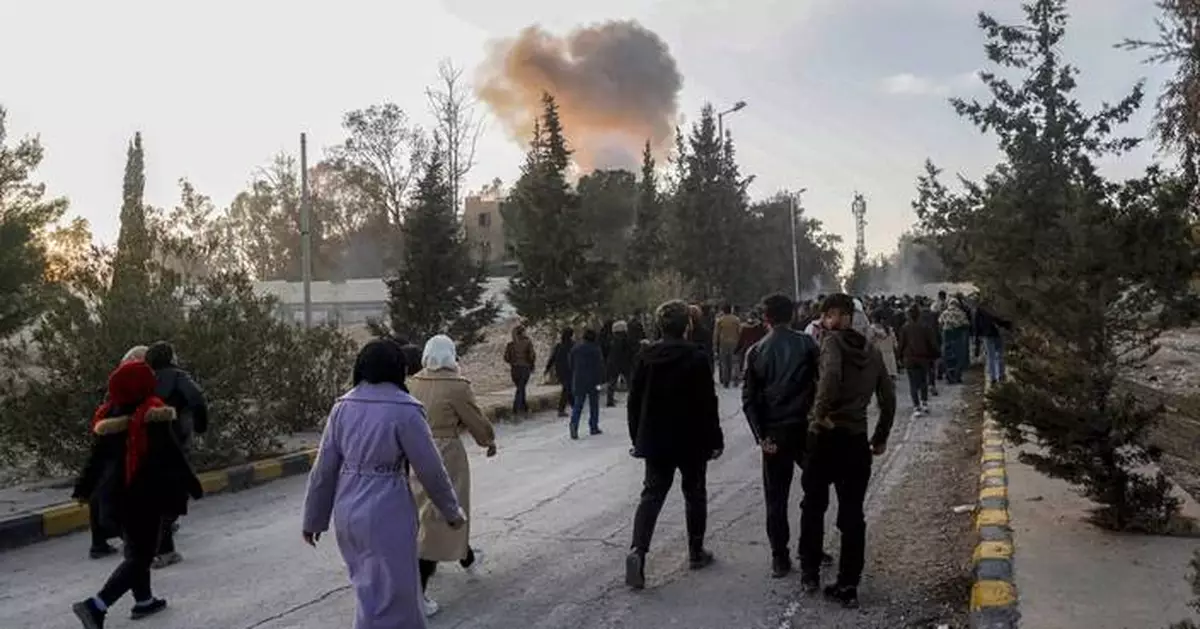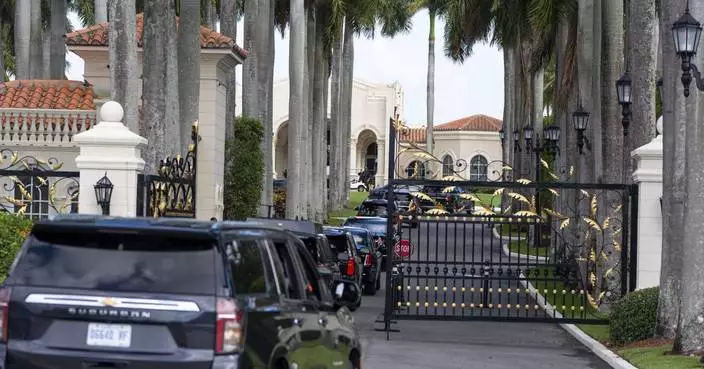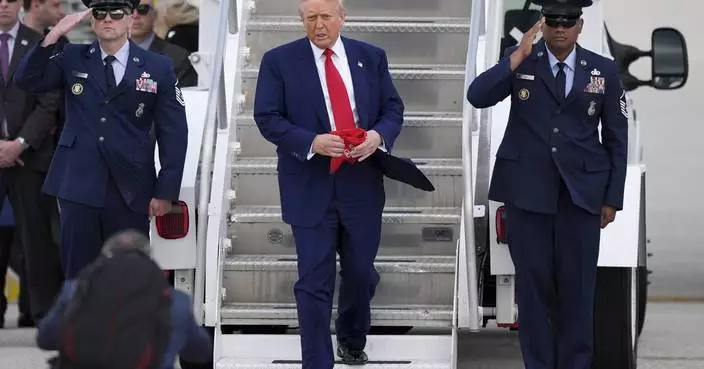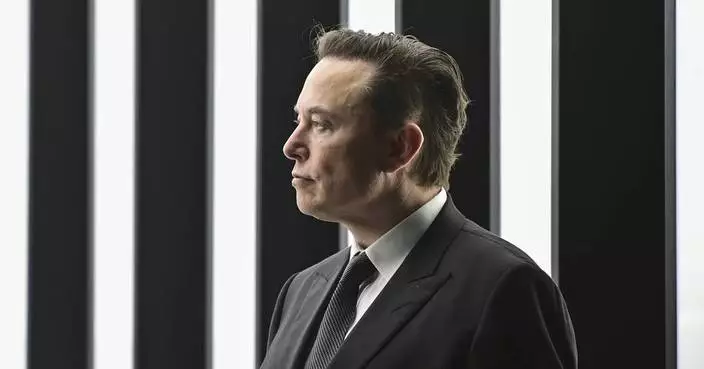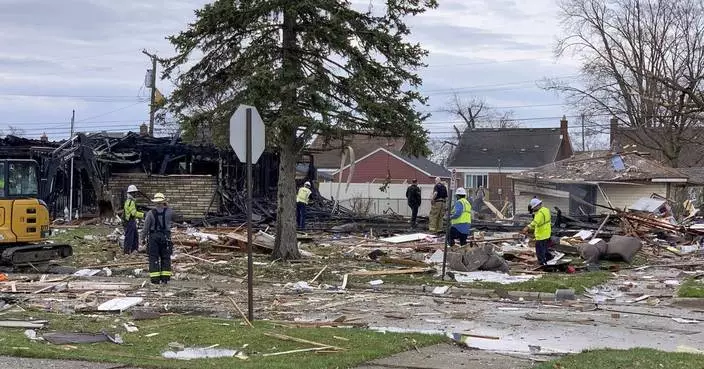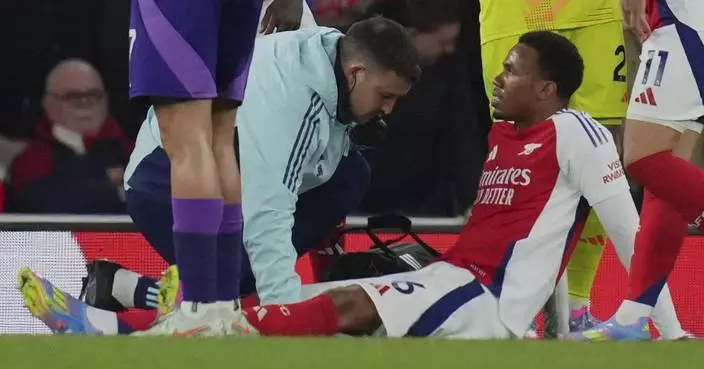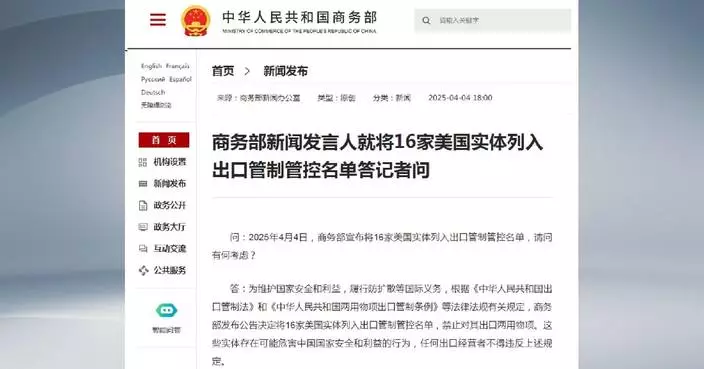TISHRIN DAM, Syria (AP) — A key dam in northern Syria has become a flash point in the conflict between Kurdish forces and Turkish-backed armed groups, which has intensified in the weeks since the fall of former Syrian President Bashar Assad in a lightning offensive.
Over a thousand protesters from Kurdish areas in northeast Syria gathered Wednesday afternoon at the Tishrin Dam on the Euphrates River in Aleppo province, a critical source of both water and electricity that has been at the center of clashes.
Protesters called for an end to Turkish airstrikes, which they said are damaging vital infrastructure and endangering civilian lives.
Turkish drones and warplanes remained in the air during the protest, and airstrikes targeted areas near the march route, according to participants and a war monitor. The health administration in Kobani said the strikes killed five civilians and injured 15 others.
Turkey, for its part, accused the Kurdish-led Syrian Democratic Forces of using civilians as “human shields” by encouraging them to come to the area of the fighting.
A coalition of Turkish-backed groups in Syria, known as the Syrian National Army, are carrying out attacks to take control of regions near the border with Turkey that are under control of Kurdish groups. Heavy fighting has been reported in areas near the Tishrin Dam, some 90 kilometers (60 miles) east of the city of Aleppo.
“While we were walking in this march, there were about 13 or 14 airstrikes around us,” said Berfin Dumar from Kobani, who joined Wednesday’s protest. “They tried to silence our voices so we wouldn’t be able to protect this dam.”
Farhan Haj Issa, co-chair of the executive council of the Autonomous Administration in Kobani, called for Syria’s new authorities and a U.S.-led coalition that has allied with Kurdish forces in the fight against the Islamic State to help bring about a halt to hostilities.
“After the collapse of the Baath regime, we were supposed to enter a new phase of dialogue and laying foundations to end the crisis,” he said, referring to the ruling party under Assad. “Instead, the Turkish state and its mercenaries have increased instability, added to the crisis, and turned Syria into a haven for those spreading corruption.”
He called on “whoever leads the government in Damascus to take responsibility and end the brutality and violence.”
In a later interview, Haj Issa also addressed the U.S.-led coalition.
“We stood united with the coalition against international terrorism,” he said. “Now, it’s time for them to stand with us against this aggression.”
The new Syrian government is de facto led by the Islamist former insurgent group Hayat Tahrir al-Sham, or HTS, which allied with the Turkish-backed groups in the offensive that toppled Assad.
HTS leader Ahmad al-Sharaa has called for the Kurdish-led Syrian Democratic Forces to be integrated in the national army that the new authorities in Damascus are attempting to form from a patchwork of armed factions.
The state-run Anadolu Agency quoted unnamed Turkish defence ministry officials Thursday as saying the SDF was using “innocent civilians as human shields” in the Tishrin Dam region, adding that the practice is against “international law, human rights and humanity.”
Turkey views the SDF as an extension of the banned Kurdistan Workers’ Party, or PKK, which is listed as a terror organization by Turkey and several other states, and has conducted several cross-border operations against the group since 2016.
The SDF is, however, allied with the United States in the fight against the Islamic State group in Syria.
The Turkish government has repeatedly threatened to launch a new military offensive unless the Syrian Kurdish fighters lay down arms.
———
Martany reported from Irbil. Associated Press staff writer Suzan Fraser in Ankara contributed.
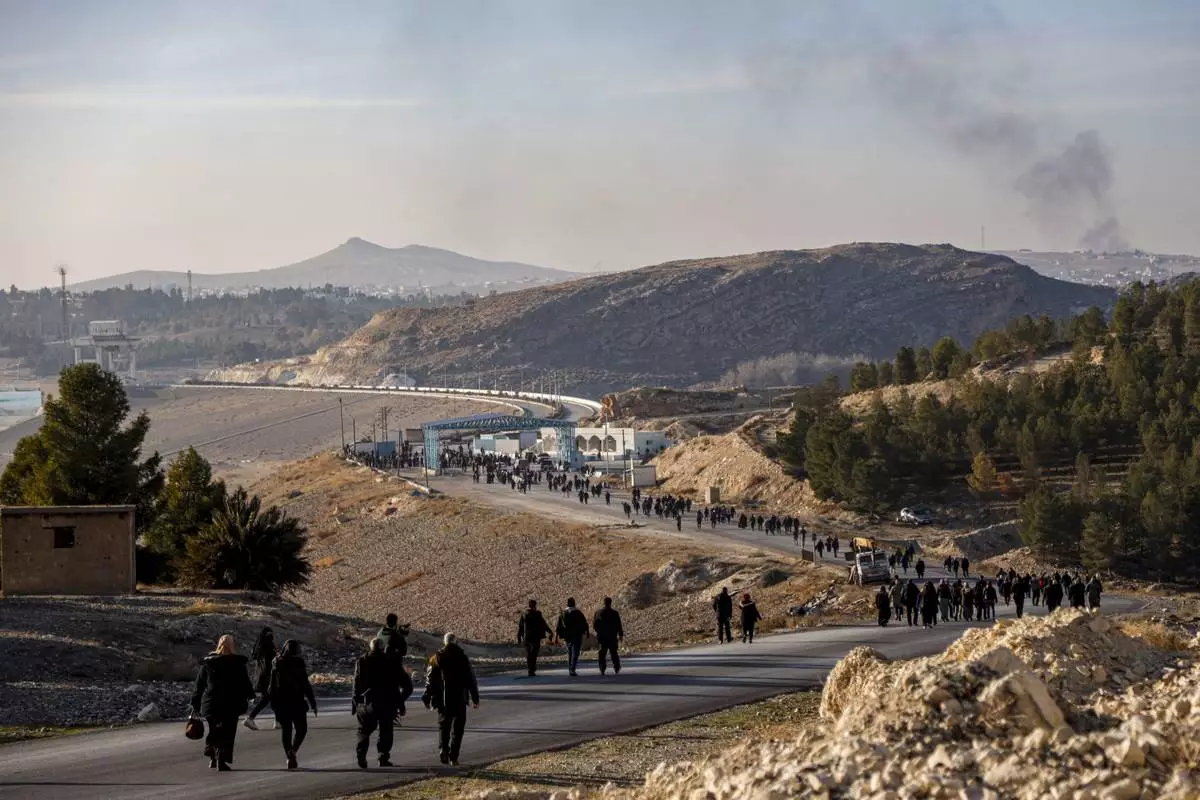
Residents of northeastern Syria walk towards the Tishrin Dam to join a sit-in demanding an end to the war in the region in Aleppo's countryside, Syria, Wednesday Jan. 8, 2025. The Tishrin Dam has become a flashpoint in the conflict between Kurdish forces and Turkish-backed armed groups, which has intensified in the weeks since the fall of former Syrian President Bashar Assad in a lightning offensive.(AP Photo/Baderkhan Ahmad)
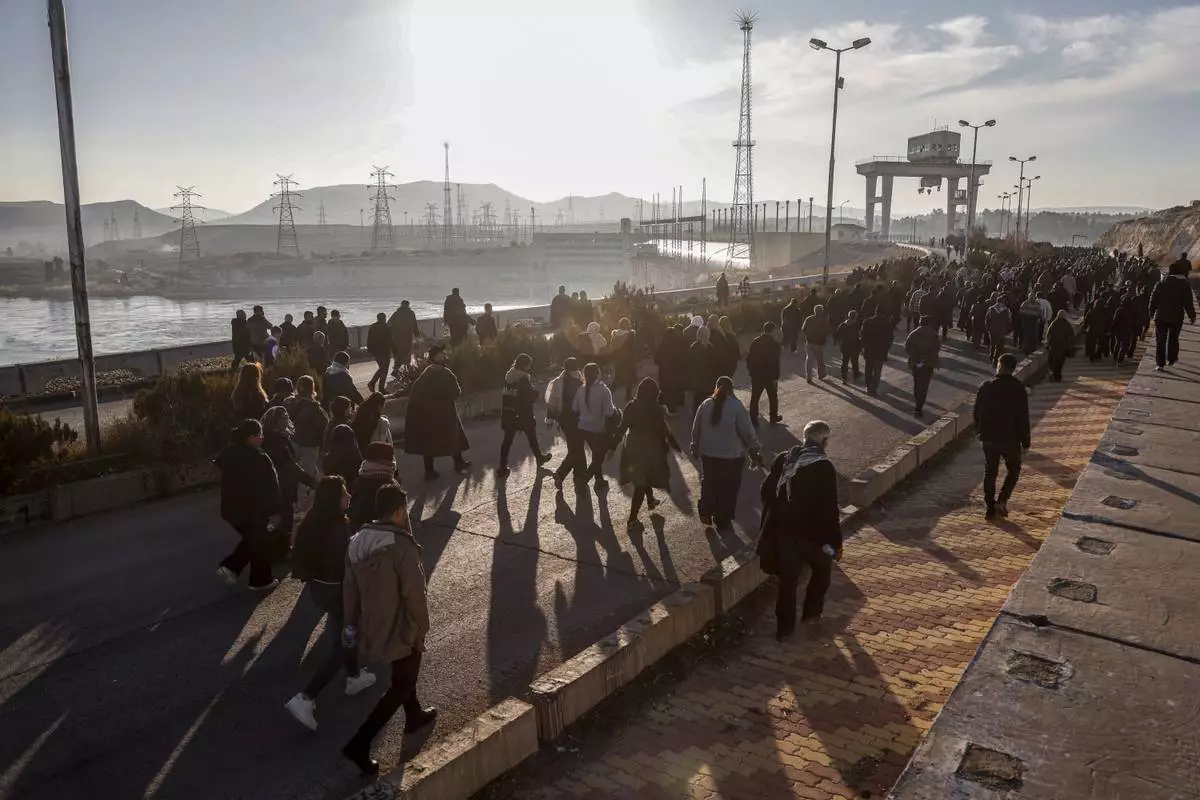
Residents of northeastern Syria walk at the Tishrin Dam to join a sit-in demanding an end to the war in the region in Aleppo's countryside, Syria, Wednesday Jan. 8, 2025. The Tishrin Dam has become a flashpoint in the conflict between Kurdish forces and Turkish-backed armed groups, which has intensified in the weeks since the fall of former Syrian President Bashar Assad in a lightning offensive.(AP Photo/Baderkhan Ahmad)
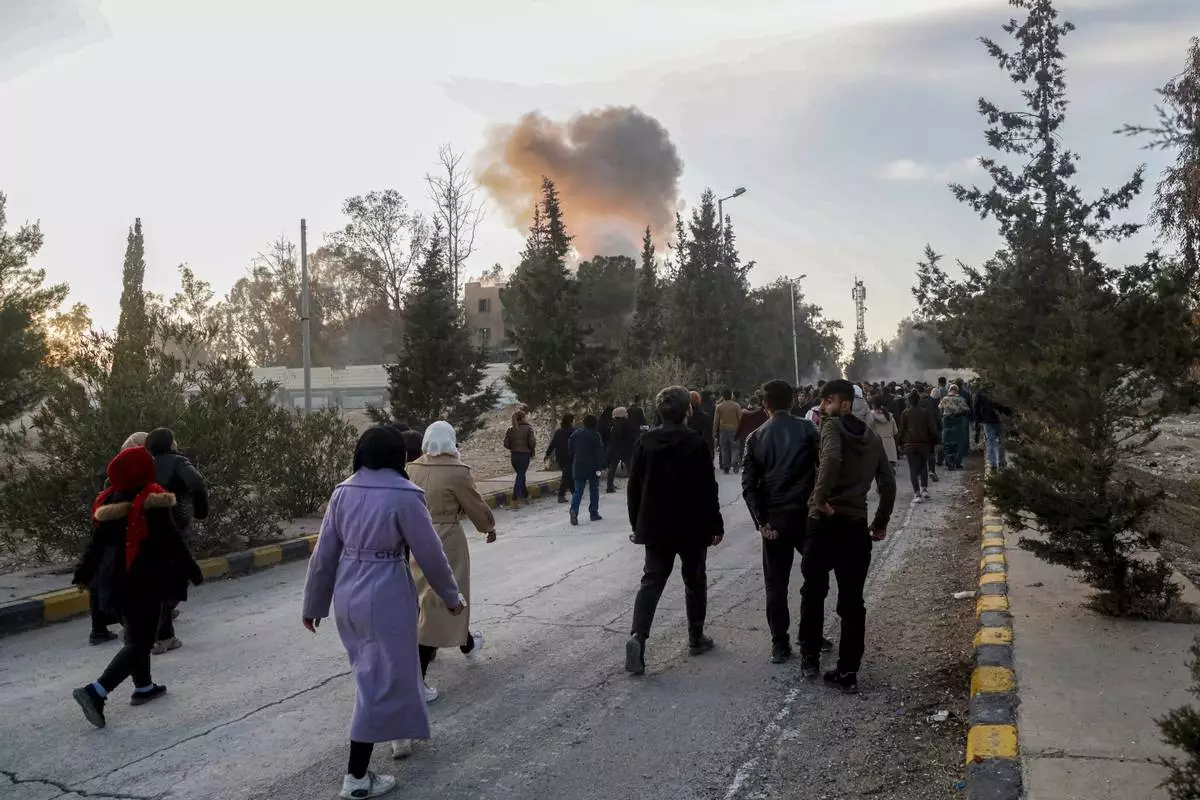
A Turkish drone strike hits near protesters demanding an end to the war around the Tishrin Dam, Syria, Wednesday, Jan. 8, 2025. Turkish drones and warplanes hovered during the protest, with airstrikes targeting areas near the march route, according to participants and a war monitor. The health administration in Kobani reported five civilians killed and 15 injured. (AP Photo/Baderkhan Ahmad)
WASHINGTON (AP) — As stock markets tumble in the aftermath of President Donald Trump's sweeping tariffs, Republicans in Congress were watching with unease and talking of clawing back their power to levy tariffs — but almost none seemed ready to turn their words into action.
The Republican president is upending longstanding GOP principles like support for free trade, yet despite clear misgivings and a Constitutional mandate to decide tariffs, most lawmakers were not ready to cross Trump. Instead, they were focusing all their attention on advancing the president's " big, beautiful bill ” of tax breaks and spending cuts, even as tariffs — in essence, import taxes — threatened to raise consumer prices across the board and push the global economy into a recession.
As the fallout from Trump's announcement reverberated around global markets, Senate Majority Leader John Thune, who has made it clear he is no fan of tariffs, told reporters that he would give Trump "the benefit of the doubt” in hopes that the announcement was just a scare tactic to prod foreign leaders into negotiating better trade deals with the U.S.
“The president is a dealmaker if nothing else, and he's going to continue to deal country by country with each of them,” said Sen. John Barrasso, a Wyoming Republican who is no. 2 in GOP Senate leadership. He added that Treasury Secretary Scott Bessent had told Senate Republicans this week that the tariffs announced by Trump would be a “high level mark with the ultimate goal of getting them reduced” unless other countries retaliate.
But countries like China are already retaliating with tariffs of their own, and while the president has signaled he is open to negotiations, he was mostly sounding a defiant tone Friday, saying on social media that “MY POLICIES WILL NEVER CHANGE” while claiming that foreign investors were lining up to invest in U.S. industries. He was on the golf course Friday near his Mar-a-Lago private club in Florida.
Congress, however, was jittery.
A handful of Republicans have rebuked Trump's strategy as a foolhardy path that will burden U.S. households. Kentucky Sen. Mitch McConnell, the longtime Senate leader who was the standard-bearer for past generations of Republicans, released a lengthy statement saying, “As I have always warned, tariffs are bad policy, and trade wars with our partners hurt working people most.”
McConnell and three other Republicans joined with Democrats this week to help pass a resolution that would nullify Trump's tariffs on Canada, sending a rebuke to the president just hours after his “Liberation Day” announcement. But House Speaker Mike Johnson quickly indicated he has no interest in giving the resolution a vote.
Lawmakers' struggle to act showed the divide among Republicans on trade policy, with a mostly younger group of Republicans fiercely backing Trump's strategy. Rather than heed traditional free trade doctrine, they argue for “America First” protectionism and hope it will revive U.S. manufacturing.
Republican Sen. Josh Hawley said that workers in his home state of Missouri were “absolutely thrilled” with the tariffs. “We've been losing jobs left and right. Farmers want to see a fair deal for our products, both in Canada and in Mexico and from the (European Union)," he added.
For their part, Democrats slammed Trump's tariffs as a reckless maneuver meant to do nothing more than raise funds for the tax breaks Trump and Republicans are trying to pass.
“Why would he raise the costs on American families by $5,000, as it’s estimated? Simply because his very wealthy billionaire friends want a greater tax break,” Senate Democratic Leader Chuck Schumer said in a floor speech Friday.
Other Republicans were looking for roundabout ways to at least check the president's power on trade policy. Sen. Chuck Grassley, a senior Republican from Iowa, introduced a bipartisan bill Thursday that would require presidents to justify new tariffs to Congress. Lawmakers would then have to approve the tariffs within 60 days, or they would expire.
Although Grassley emphasized that he had long been working on the idea, the timing of the bill was notable. It gave Republicans a chance to talk about their distaste for import taxes and raised the prospect of Congress clawing back some of its power over tariffs. The Constitution gives Congress the responsibility of setting taxes and tariffs, but over the last century, lawmakers have ceded much of their power over import taxes to the president.
A handful of Republicans said they were favorable to Grassley's proposal, though the idea of directly defying Trump seemed to squelch potential for quick action.
“I don’t want to do it in a politically charged environment,” said Sen. Mike Rounds, a South Dakota Republican. “But I absolutely agree. This was set up by the Founding Fathers to be Congress’s role. And, I think we’re way past the point of what the Founding Fathers ever wanted to have happen."
Democratic Sen. Brian Schatz seized on the hesitation from Republicans, saying on social media Friday that the Senate would overwhelmingly repeal or constrain tariff authority “if every Senator voted their conscience and their state’s interest.”
“Mostly everyone hates this, they are just too afraid of the Mad King at the moment,” Schatz added.
Sen. John Kennedy, a Louisiana Republican, also predicted the bill would never pass “because of the voting requirements in the Senate.”
But he was still taking to social media to offer a folksy bit of advice: “Tariffs are like whiskey: A little whiskey, under the right circumstances, can be refreshing — but too much whiskey, under the wrong circumstances, can make you drunk as a goat.”
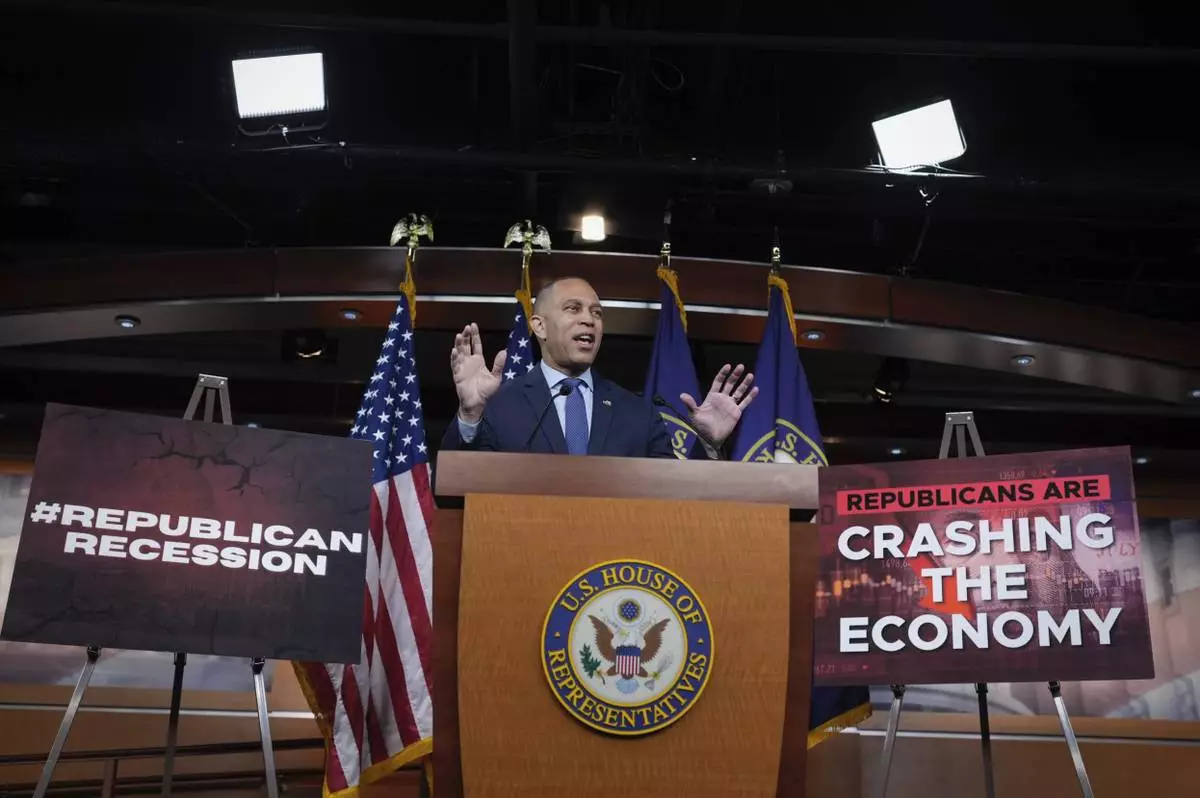
House Minority Leader Hakeem Jeffries, D-N.Y., criticizes the agenda of President Donald Trump and the tactics of billionaire Elon Musk in a pivotal Wisconsin election where Democrats won, during a news conference at the Capitol, in Washington, Wednesday, April 2, 2025. (AP Photo/J. Scott Applewhite)
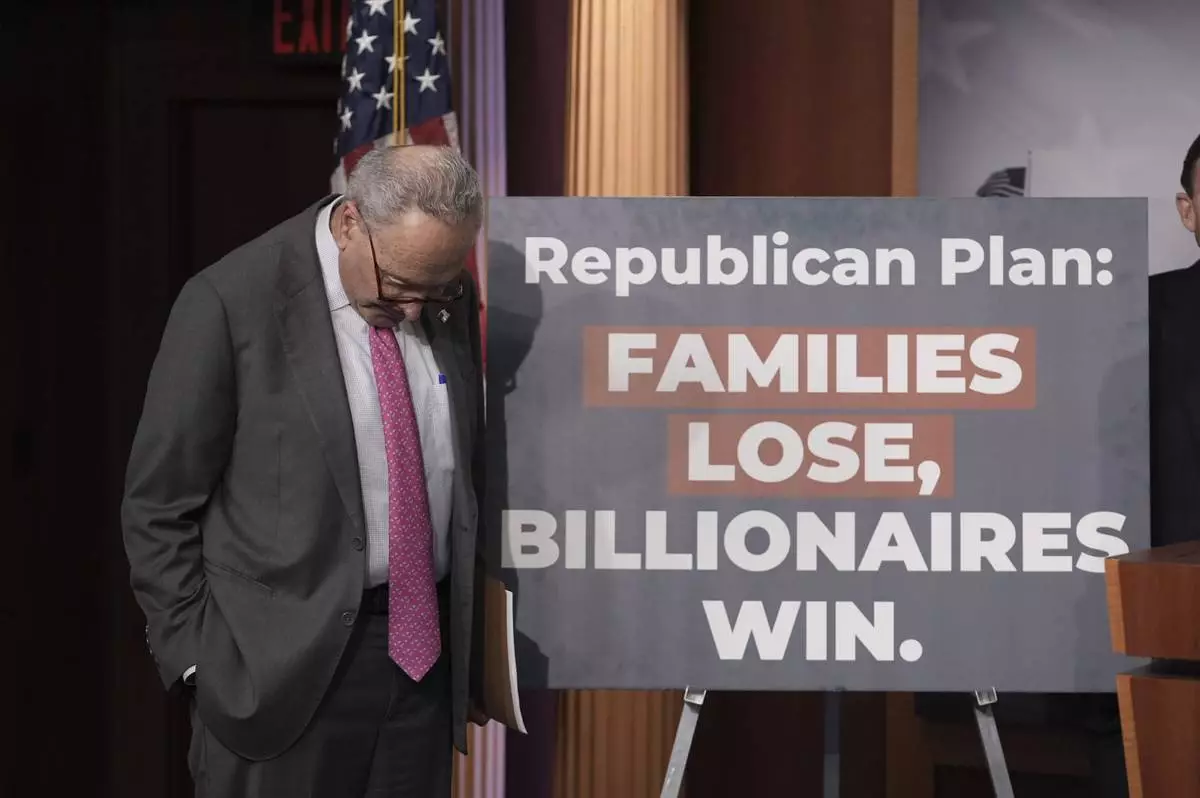
Senate Minority Leader Chuck Schumer, D-N.Y., attends a news conference discussing the Republican-backed budget plan at the Capitol, in Washington, Thursday, April 3, 2025. (AP Photo/J. Scott Applewhite)
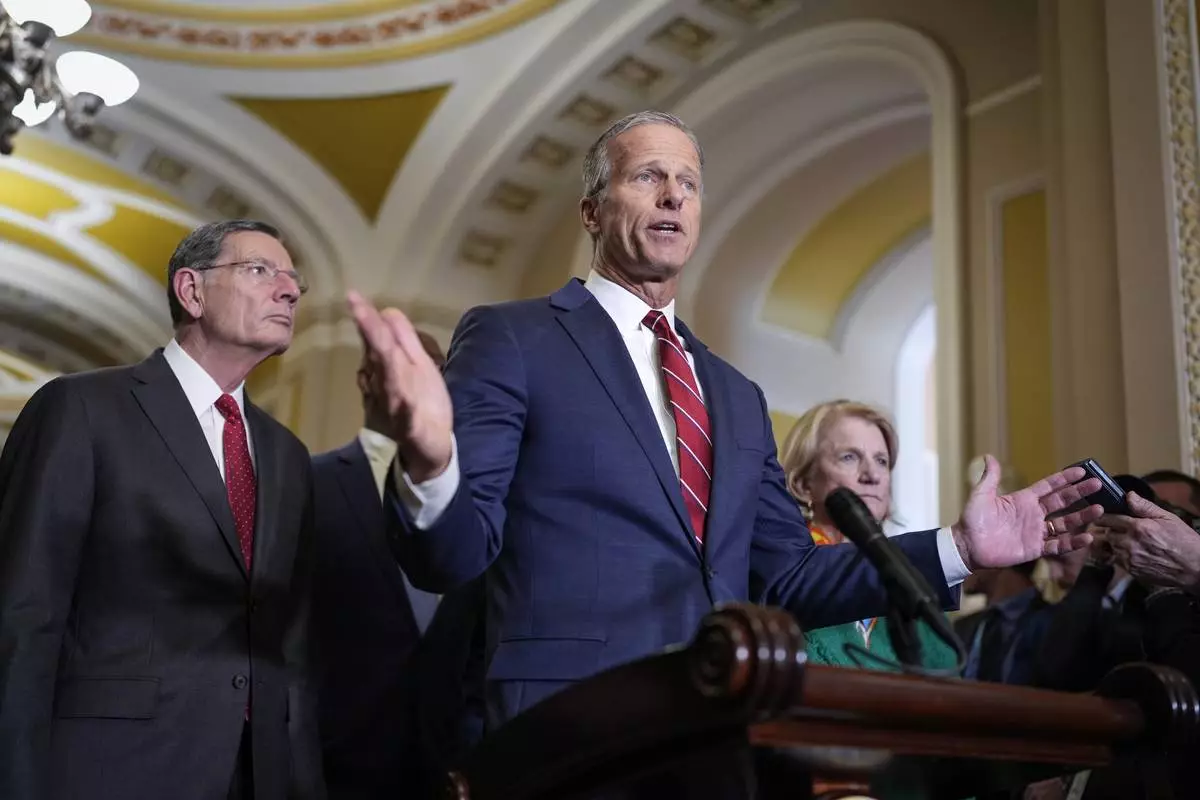
Senate Majority Leader John Thune, R-S.D., joined by Sen. John Barrasso, R-Wyo., the GOP whip, left, talks to reporters ahead of announcements by President Donald Trump on tariffs, at the Capitol, in Washington, Tuesday, April 1, 2025. (AP Photo/J. Scott Applewhite)
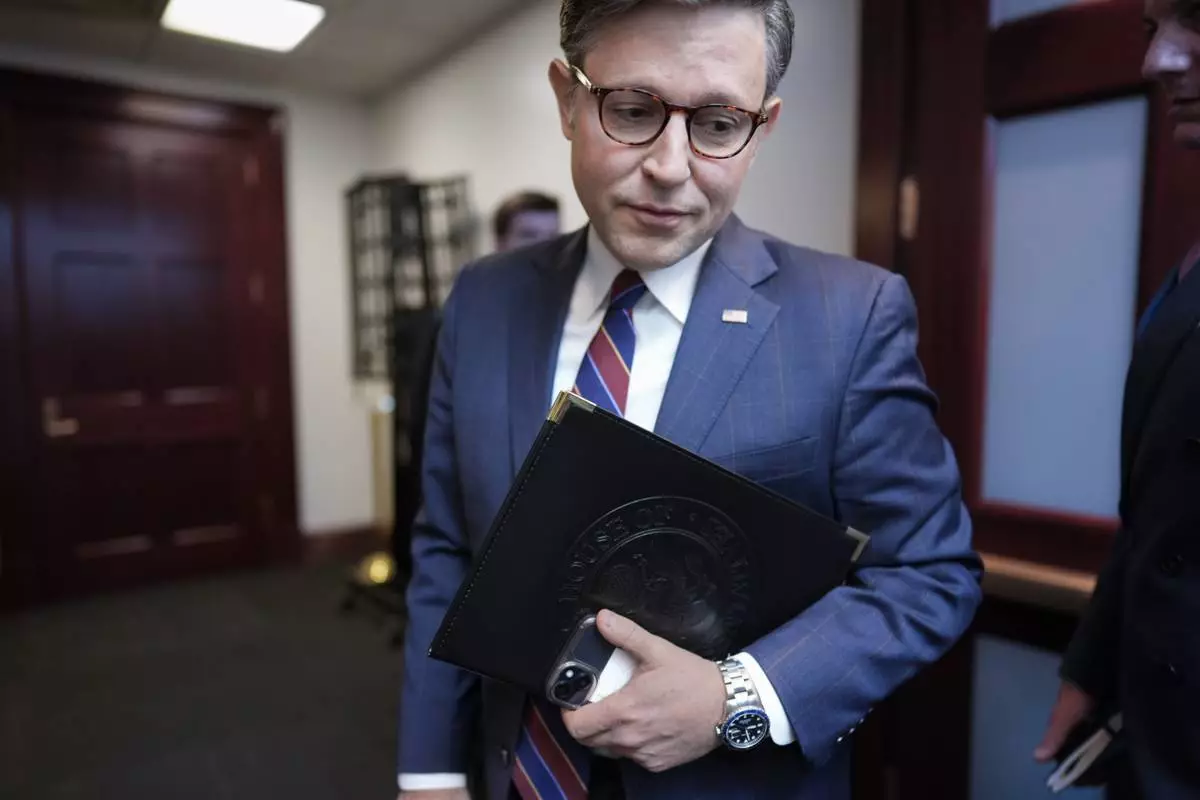
Speaker of the House Mike Johnson, R-La., talks with reporters as he arrives for a closed-door strategy session with fellow Republicans ahead of announcements by President Donald Trump on tariffs, at the Capitol, in Washington, Tuesday, April 1, 2025. (AP Photo/J. Scott Applewhite)
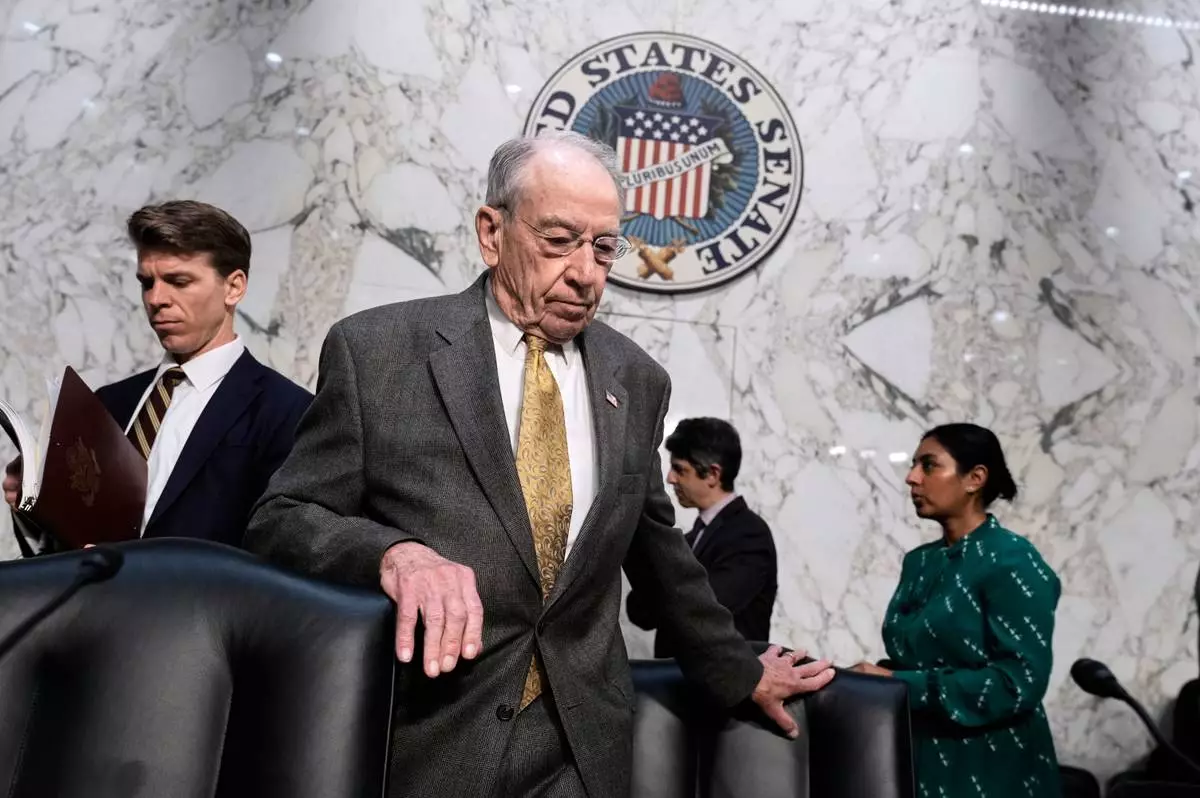
Senate Judiciary Committee Chairman Chuck Grassley, R- Iowa, takes his seat as the panel meets to consider prescription drug pricing and other measures, at the Capitol in Washington, Thursday, April 3, 2025. (AP Photo/J. Scott Applewhite)





